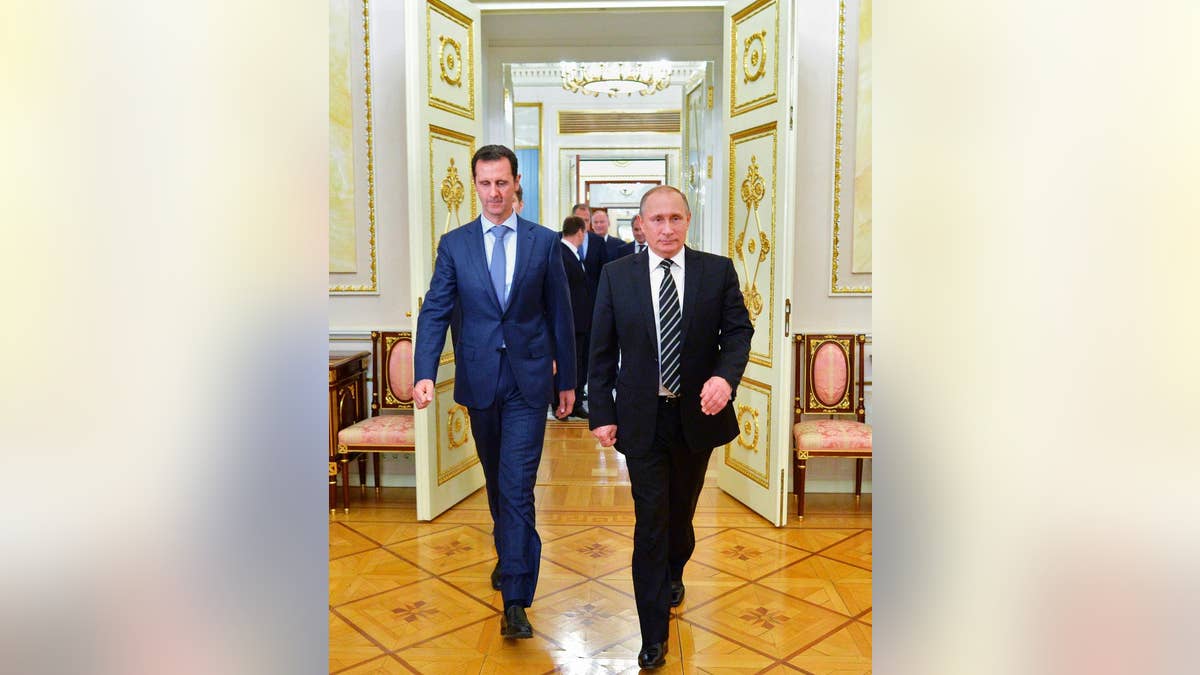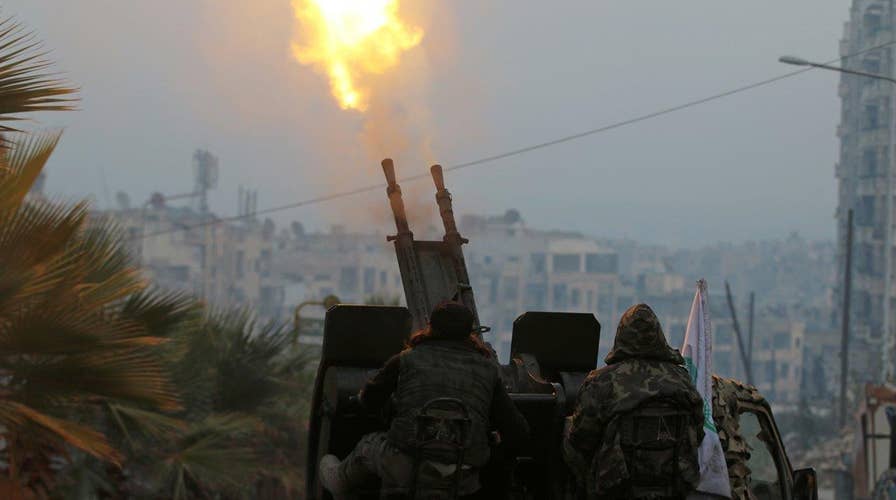Russia and Turkey have pushed a deal to end Syria's nearly-six-year-long civil war -- which could leave the dictator Bashar al-Assad with much less power than before, and eventually force him out of office, Reuters reported.

Syrian President Bashar al-Assad, left, with Russian President Vladimir Putin in the Kremlin in 2015. (Alexei Druzhinin, RIA-Novosti, Kremlin Pool Photo via AP, File)
Russia, Turkey and Iran -- leaving out the United States -- were crafting the potential deal ahead of Thursday's cease-fire announcement, sources told the news agency on Wednesday. They said Iran was balking at the proposal to cut Assad's power, but either way, the plan would be to push him out of office in a way that saves face as much as possible.
TURKEY DEMANDS LEBANON'S MILITANT HEZBOLLAH LEAVE SYRIA
"A final deal will be hard, but stances have shifted," Andrey Kortunov, director general of the Russian International Affairs Council, said.
Foreign Minister Sergey Lavrov said President-elect Donald Trump's administration would be welcome to join the Syrian peace process once he takes office.
ISIS 'GANG LEADER' KILLED IN SYRIA, PENTAGON OFFICIALS SAY
The cease-fire plan would informally divide Syria into zones of power influence, the sources said. They added that Assad would stay in office for at least a few years.
Among the power shifts: Turkey could see more control over northern Syria, potentially using part of the land as a base for anti-Assad rebels, whom President Recep Tayyip Erdogan's government supports.
Both Russia and Iran have provided major backing to Assad's fighters, in the form of Iranian soldiers and Russian airpower. While Iran has been slow to make compromises at the bargaining table, the sources said Tehran agreed to talk after Turkey dropped its push to force Assad from power immediately.
Still, Iran's name was noticeably left out of the truce agreement announced Thursday. Russian President Vladimir Putin said Moscow and Turkey would guarantee the cease-fire.
"Our priority is not to see Assad go, but for terrorism to be defeated," a senior Turkish government official told Reuters. "It doesn't mean we approve of Assad. But we have come to an understanding."
Syria's military said it agreed to a nationwide cease-fire starting at midnight, adding that it paved the way for reactivating negotiations to end the civil war entirely.
"News of a ceasefire in the Syrian civil war is a positive development," U.S. State Department Deputy Spokesperson Mark Toner said in a statement. "We hope it will be implemented fully and respected by all parties. Any effort that stops the violence, saves lives, and creates the conditions for renewed and productive political negotiations would be welcome."
Russian Defense Minister Sergei Shoigu said the truce would include 62,000 opposition fighters across Syria, and that the Russian military has established a hotline with its Turkish counterpart to monitor compliance.
It comes on the heels of the Syrian army's retaking control of Aleppo, Syria's largest city, ending the opposition's four-year hold over parts of the city.
Putin said he ordered the Russian military to scale down its presence in Syria, where it has provided crucial support to Assad's forces. Putin didn't say how many troops and weapons would be withdrawn. He said Russia would continue "fighting international terrorism in Syria" and supporting Assad's military.
Putin also said that the Russian military would maintain its presence at both an air base in Syria's coastal province of Latakia and the naval facility in the Syrian port of Tartus.
Earlier Thursday, Turkey's Foreign Minister Mevlut Cavusoglu called on Hezbollah to withdraw its fighters from Syria. The group, which has sent thousands of fighters to support Assad, has been playing an instrumental role in Syria's civil war since 2013, mostly in areas near the border with Lebanon, the suburbs of the capital Damascus and the northern city of Aleppo. The group is not likely to withdraw from Syria in the near future as its leader repeatedly said that their presence there is mostly to prevent attacks by extremists deep inside Lebanon.
Foreign fighters from around the world have joined both sides of the Syrian conflict that has so far killed more than quarter a million people, displaced half the country's population and produced more than four millions refugees.
Syria's Foreign Minister Walid al-Moallem had said that fighters from more than 80 countries have joined insurgent groups trying to remove Assad from power while the Syrian government is backed by fighters from countries including Lebanon, Iraq, Iran, Afghanistan and Russia.
Fox News' Greg Palkot and The Associated Press contributed to this report.

